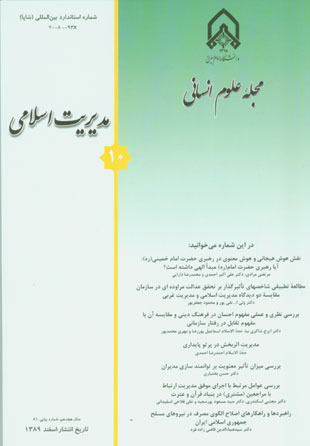The Components of Organizational Effectiveness of Schools and Its Relationship with Teacher's Traits
Author(s):
Abstract:
This piece of research is intended to review the components of organizational effectiveness of schools and the socio-educational factors which influence it. This is a survey research which has collected data by applying organizational effectiveness questionnaire of Baldwin School (SEQ, 1993-1998). Baldwin questionnaire reviews 11 factors of school effectiveness. Teachers’ traits include four variables: gender, age, years of working, and education. High schools teachers of Shahreza in academic school year 1384-85 were selected as the subject of this research. The data were coded after being gathered. Then, SPSS statistical software was applied to analyze the data. Explanatory univariate and bivariate, as well as referential methods were used for data analysis.The results indicated that organizational effectiveness of school was very high. The researcher found out that the eleven factors of effectiveness can be set in the following order: effective educational leadership, positive atmosphere of the school, frequent evaluation and control of students’ achievements. Clear scientific justification, participation of the teachers in educational decision making, optimum learning opportunities, excessive educational expectancies, immune and organized school environment, professional development of teachers, emphasis on main skills, the necessity of relationship between school and home. The results also indicated that there was no significant relationshipbetween the four-fold traits of the teachers (gender, age, years of working, and education). The researchers also found out that all eleven factors can be merged into one factor. This is called the indicator of organizational effectiveness of school.
Language:
Persian
Published:
Journal of Human Science, Volume:18 Issue: 80, 2011
Page:
161
https://magiran.com/p850968
سامانه نویسندگان
مقالات دیگری از این نویسنده (گان)
-
اعجاز تربیتی قرآن در انذار از منظر علامه طباطبایی (بررسی مقایسه ای غرض شناسی سوره های انذار شناخت قرآنی بر اساس تفسیر المیزان)
نشریه قرآنی کوثر، زمستان 1403 -
تبیین سرمایه اجتماعی خانواده در جامعه ایرانی: ساخت و طراحی الگو و مدل جامع براساس روش فراترکیب
نشریه مطالعات کاربردی در علوم اجتماعی و جامعه شناسی، پاییز 1403



